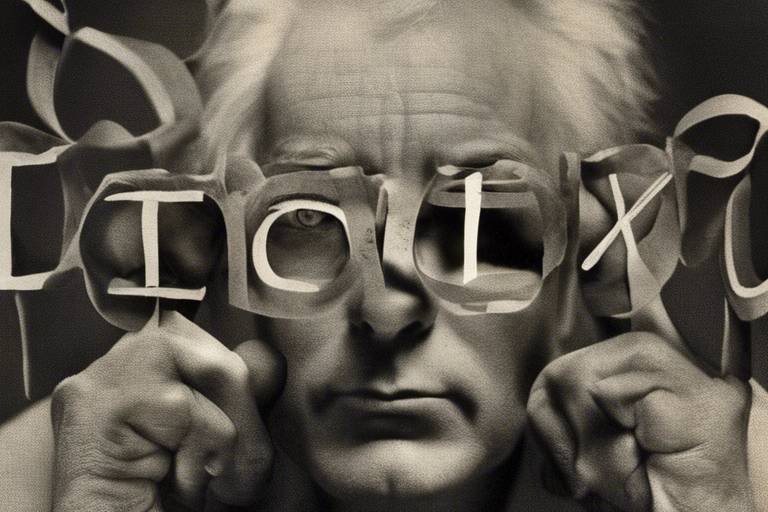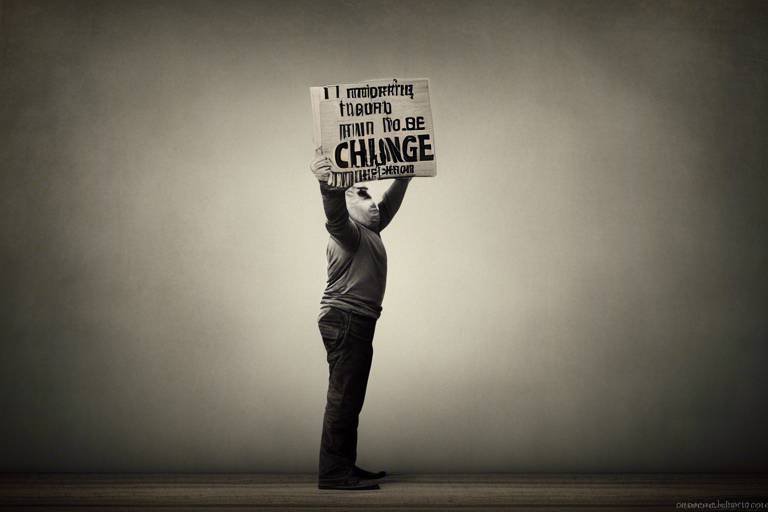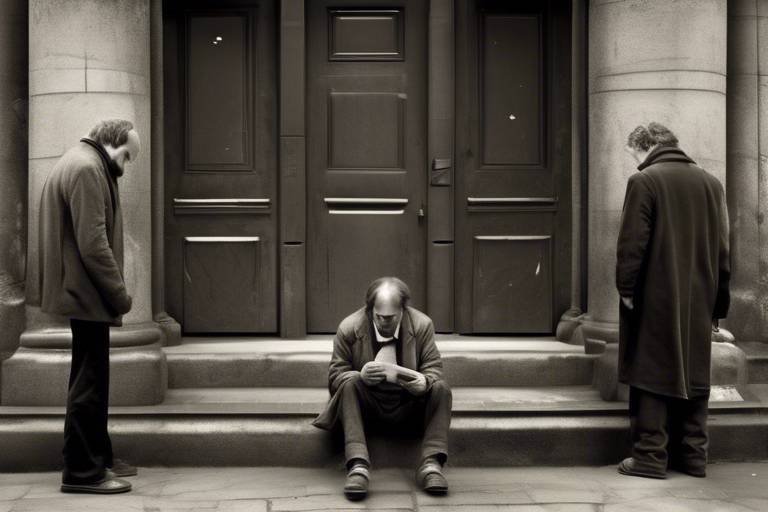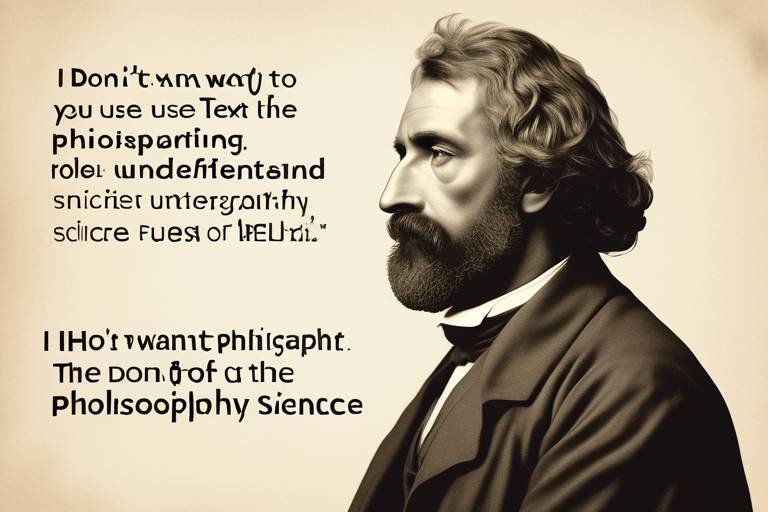Analyzing the Concept of Justice in Philosophy
Justice is a concept that has intrigued philosophers for centuries, acting as a cornerstone for ethical discussions and societal norms. It is not merely a legal term but a profound idea that resonates through various aspects of our lives. The journey to understanding justice is akin to peeling an onion; each layer reveals deeper complexities and nuances that demand our attention. From the ancient musings of Plato and Aristotle to the modern interpretations by thinkers like John Stuart Mill and Immanuel Kant, the philosophical discourse surrounding justice is rich and varied. This article aims to explore these multifaceted perspectives, examining how they shape our current understanding of justice and its implications in contemporary society.
At its core, justice embodies the principles of fairness, equality, and moral righteousness. However, what does it truly mean to be just? Is it merely about adhering to laws, or does it encompass a broader moral obligation to treat others with dignity and respect? These questions have sparked debates that traverse cultural, historical, and social boundaries. For instance, while some may argue that justice is about the equitable distribution of resources, others might contend that it is rooted in individual rights and freedoms. This divergence in interpretation not only reflects our diverse human experiences but also highlights the challenges in establishing a universally accepted definition of justice.
The philosophical exploration of justice is crucial because it influences various domains, including law, politics, and social movements. As we delve into the historical perspectives on justice, we will uncover foundational ideas that have paved the way for modern thought. Thinkers like Plato envisioned a society governed by philosopher-kings, where justice was synonymous with the common good. In contrast, Aristotle introduced the notion of distributive justice, emphasizing the importance of proportionality in the allocation of resources. These early theories laid the groundwork for contemporary discussions, illustrating how the past continuously informs our present.
As we navigate through the different theories of justice, we will also encounter the principles of utilitarianism, which advocates for the greatest happiness for the greatest number. However, this perspective is not without its critics, who argue that it can neglect minority rights in the pursuit of overall happiness. The balance between individual rights and collective welfare remains a contentious issue, prompting further inquiry into how we define justice in a pluralistic society. Furthermore, we will explore the deontological approach championed by Kant, which posits that justice is grounded in moral duty rather than outcomes. This shift in focus from consequences to principles invites us to reconsider our ethical frameworks and the responsibilities they entail.
In our exploration, we cannot overlook the significance of social justice, which advocates for equity and fairness within society. Movements for social justice have gained momentum in recent years, emphasizing the need to address systemic inequalities and promote inclusivity. The philosophical underpinnings of these movements challenge us to reflect on our societal structures and the barriers that hinder justice for all. Additionally, concepts like distributive justice and restorative justice offer valuable insights into how we can create more equitable systems that prioritize healing and fairness over punishment.
Finally, as we confront contemporary challenges to justice, including the impact of technology and globalization, it becomes evident that our understanding of justice is continually evolving. The rise of digital platforms raises pressing questions about privacy and rights, complicating traditional notions of justice. Moreover, global perspectives on justice reveal how different cultures interpret fairness and equity, influencing international justice systems. This exploration highlights the dynamic nature of justice, reminding us that it is not a static concept but one that requires ongoing dialogue and reflection.
- What is the definition of justice in philosophy? Justice in philosophy refers to the principles of fairness, equality, and moral righteousness that guide human interactions and societal norms.
- How do historical perspectives influence modern understandings of justice? Historical thinkers like Plato and Aristotle laid foundational ideas that continue to shape contemporary discussions on justice, including notions of fairness and moral duty.
- What are the key theories of justice? Key theories of justice include utilitarianism, deontological ethics, social justice, distributive justice, and restorative justice, each offering different perspectives on fairness and equity.
- How does technology impact our understanding of justice? The rise of digital technologies raises questions about privacy, rights, and the implications of surveillance, complicating traditional notions of justice.

[Historical Perspectives on Justice]
The concept of justice has been a cornerstone of philosophical inquiry for centuries, with deep roots tracing back to ancient civilizations. Thinkers like Plato and Aristotle laid the groundwork for how we understand justice today. Plato, in his seminal work The Republic, envisioned a society governed by philosopher-kings, where justice was synonymous with the harmony of the whole. He famously argued that justice is a virtue that exists when everyone in society performs their designated role, contributing to the overall order and balance.
On the other hand, Aristotle took a more pragmatic approach. He believed that justice is about giving people their due, which he articulated through the concept of distributive justice. According to Aristotle, justice isn't just about equality but about equity—ensuring that individuals receive what they deserve based on their contributions and needs. His idea of rectificatory justice further illustrates this, emphasizing the importance of restoring balance when wrongs are committed.
These foundational ideas paved the way for numerous interpretations of justice throughout history. In the medieval period, thinkers like Thomas Aquinas integrated Christian theology with Aristotelian principles, suggesting that justice is rooted in divine law. He argued that human laws should reflect moral truths, bridging the gap between secular governance and spiritual ethics.
Fast forward to the Enlightenment, where the notion of justice began to shift significantly. Philosophers such as John Locke and Jean-Jacques Rousseau introduced ideas about natural rights and social contracts. Locke's assertion that individuals have inherent rights to life, liberty, and property influenced modern democratic principles and emphasized the role of government in protecting these rights. Rousseau, meanwhile, challenged the status quo by arguing that true justice arises from the collective will of the people, encapsulated in his idea of the "general will."
As we delve deeper into the 19th and 20th centuries, the discourse around justice continued to evolve. The emergence of utilitarianism brought a consequentialist perspective, focusing on the greatest good for the greatest number. This shift sparked debates about the implications of sacrificing individual rights for the sake of societal benefit, a tension that remains relevant today.
To summarize, the historical perspectives on justice reveal a rich tapestry of thought, each contributing uniquely to our understanding of what justice means. The evolution from Plato's ideal forms to contemporary discussions about equity and rights illustrates that justice is not a static concept but a dynamic dialogue that reflects the values and challenges of each era. As we continue to grapple with these ideas, it becomes evident that the philosophical foundations laid by these thinkers are as relevant today as they were centuries ago.
- What is the main difference between Plato and Aristotle's views on justice?
Plato believed justice is about harmony and fulfilling roles within a society, while Aristotle focused on equity and giving individuals what they deserve based on their contributions.
- How did Enlightenment thinkers influence modern concepts of justice?
Thinkers like Locke and Rousseau introduced ideas about natural rights and social contracts, emphasizing the protection of individual rights and the role of collective will in governance.
- Why is historical perspective important in understanding justice today?
Historical perspectives provide context for contemporary debates and help us understand how past ideas shape current legal and moral frameworks.

[Utilitarianism and Justice]
Utilitarianism is a philosophical theory that has sparked vibrant discussions around the concept of justice. At its core, utilitarianism posits that the rightness or wrongness of actions is determined by their consequences, specifically in terms of maximizing happiness or utility. This consequentialist approach raises important questions: Can justice truly be measured by the happiness of the majority? And what happens to those who fall outside this majority? These inquiries lead us to explore the strengths and weaknesses of utilitarianism in practical applications.
One of the most compelling aspects of utilitarianism is its straightforwardness. The idea that actions should aim for the greatest good for the greatest number is appealing and seems logical. However, the challenge lies in how we define "greatest good." Is it merely the sum of happiness, or does it encompass deeper values like dignity and rights? This complexity often leads to a tension between utilitarian ideals and the reality of human experience.
Utilitarianism’s strengths are evident in its application to policy-making and social issues. For instance, when governments consider healthcare reforms, they often weigh the potential benefits against the costs, aiming to maximize overall well-being. However, this approach can lead to troubling outcomes. Let’s take a closer look at some of the key advantages and disadvantages of utilitarianism:
| Advantages | Disadvantages |
|---|---|
| Promotes overall happiness | Can justify harmful actions against minorities |
| Simplifies decision-making processes | Ignores the moral significance of individual rights |
| Encourages a broad perspective on consequences | Challenges in measuring happiness or utility |
John Stuart Mill, a prominent figure in utilitarian thought, further nuanced this theory by emphasizing individual rights and happiness. He argued that true justice must consider not just the majority's happiness but also the qualitative aspects of pleasures. Mill believed that some pleasures (like intellectual fulfillment) are inherently superior to others (like mere physical satisfaction). This perspective encourages us to reflect on the **quality** of happiness and its implications for justice.
However, utilitarianism is not without its critics. Detractors argue that it can lead to morally questionable decisions, such as sacrificing the rights of a few for the happiness of many. For example, in a scenario where a community must decide whether to allocate resources to a project that benefits the majority but harms a minority, utilitarianism might endorse the project, raising ethical concerns about justice and fairness. Critics highlight that justice should not merely be about outcomes but must also consider the **process** through which decisions are made.
As we delve into the practical applications of utilitarianism, we see its principles manifest in various justice systems. From criminal justice reforms to social policies, utilitarian ideals often guide decisions aimed at improving overall societal welfare. Yet, it is essential to remain vigilant about the potential for utilitarianism to overlook individual rights in favor of collective happiness. The challenge lies in striking a balance between promoting the common good while ensuring that the rights of all individuals are respected.
In conclusion, while utilitarianism offers a compelling framework for understanding justice through the lens of outcomes, it also presents significant challenges. As we navigate the complexities of justice in our contemporary world, it becomes crucial to engage with both utilitarian principles and the ethical implications they entail. After all, justice is not merely about achieving the greatest good but also about ensuring that every voice is heard and valued in the process.
- What is the main principle of utilitarianism? Utilitarianism is based on the idea that the best action is the one that maximizes overall happiness or utility.
- Who is the most famous utilitarian philosopher? John Stuart Mill is one of the most well-known proponents of utilitarianism.
- What are some criticisms of utilitarianism? Critics argue that it can justify actions that harm minorities and overlook individual rights in favor of the majority's happiness.

[Mill's Contribution]
John Stuart Mill, a towering figure in the realm of philosophy, made significant strides in how we understand justice, particularly through the lens of utilitarianism. His work, especially in "Utilitarianism," lays out a framework that intertwines the concepts of justice, individual rights, and happiness. Mill argued that true justice should not merely be about the majority's happiness but should also consider the well-being of individuals. This was a pivotal shift from earlier utilitarian thinkers who often prioritized the collective over the individual.
One of Mill's key contributions was his assertion that justice is fundamentally linked to the protection of individual rights. He believed that individuals possess certain rights that are essential for their happiness and development. Mill famously stated that "the only freedom which deserves the name is that of pursuing our own good in our own way." This perspective emphasizes that justice is not just about the outcomes but also about the processes that respect and uphold individual rights. He posited that any action that violates these rights is inherently unjust, regardless of the consequences.
In practical terms, Mill's ideas encourage us to consider the following when assessing justice:
- Individual Rights: The protection of personal freedoms must be a priority in any just society.
- Happiness as a Measure: Happiness should be the ultimate goal of justice, guiding our actions and policies.
- Balancing Interests: Justice requires a balance between the rights of individuals and the needs of society as a whole.
Mill's nuanced interpretation of justice is particularly relevant in contemporary discussions about human rights and social justice movements. His ideas suggest that a just society must not only seek the greatest good for the greatest number but also ensure that individual rights are safeguarded. This dual focus creates a more comprehensive understanding of justice that resonates with modern ethical debates.
Moreover, Mill's contribution extends beyond theoretical analysis; it invites us to reflect on real-world implications. For instance, when we consider legislation or public policy, Mill's framework prompts us to ask, "Does this law protect individual rights?" or "Will this policy enhance overall happiness without infringing on personal freedoms?" These questions are crucial as we navigate complex social issues today.
In conclusion, Mill's interpretation of justice serves as a vital bridge between utilitarian thought and the protection of individual rights. His emphasis on happiness, coupled with a firm stance on individual freedoms, enriches our understanding of justice and challenges us to create a society that values both collective well-being and personal dignity.
- What is Mill's primary argument regarding justice?
Mill argues that justice is inherently linked to the protection of individual rights and that true justice must consider both the happiness of the majority and the rights of individuals. - How does Mill's view differ from traditional utilitarianism?
Unlike earlier utilitarians who focused solely on the greatest good for the greatest number, Mill emphasizes the importance of individual rights, suggesting that they should not be sacrificed for collective happiness. - Why is Mill's contribution relevant today?
Mill's ideas continue to resonate in contemporary discussions about human rights and social justice, prompting us to consider how laws and policies affect individual freedoms and overall happiness.

[Critiques of Utilitarianism]
Utilitarianism, while celebrated for its straightforward approach to morality and ethics, has faced substantial critiques that challenge its efficacy and moral foundations. One of the most significant criticisms is its potential to overlook individual rights. Imagine a scenario where sacrificing one innocent person could save a hundred lives. A strict utilitarian perspective might justify this action, arguing that the overall happiness produced outweighs the suffering inflicted. This raises a profound ethical dilemma: is it permissible to violate one person's rights for the greater good? Critics, including philosophers like John Rawls, argue that such a viewpoint can lead to morally repugnant conclusions.
Another critique centers around the measurement of happiness itself. How do we quantify happiness? Different individuals derive pleasure from different sources, making it inherently subjective. For instance, what brings joy to one person might be anathema to another. This subjectivity complicates the utilitarian goal of achieving the greatest happiness for the greatest number. Some critics suggest that utilitarianism reduces human experiences to mere numbers, stripping away the rich tapestry of human emotions and values.
Furthermore, critics point out that utilitarianism can lead to a tyranny of the majority. In a diverse society, the preferences of the majority might systematically oppress minority groups. For example, if the majority of a society believes that certain groups should have fewer rights, utilitarianism could theoretically endorse such discrimination if it results in greater overall happiness for the majority. This concern highlights how utilitarianism can falter in addressing issues of justice and equity.
Another significant critique is the short-term versus long-term consequences. Utilitarianism often emphasizes immediate outcomes, but this can lead to decisions that are detrimental in the long run. For example, a policy that provides immediate economic benefits might result in environmental degradation that harms future generations. Critics argue that a more nuanced approach is necessary, one that considers both immediate and future impacts on well-being.
In response to these critiques, some utilitarians have attempted to refine the theory by incorporating qualitative assessments of happiness, suggesting that some pleasures are more valuable than others. This leads to a more complex understanding of well-being, but it also raises further questions about who decides the value of different pleasures and how those decisions are made.
In summary, while utilitarianism offers a compelling framework for evaluating moral actions based on their outcomes, it is not without its flaws. The critiques highlight essential considerations regarding individual rights, the subjectivity of happiness, and the potential for majority rule to infringe upon minority rights. These discussions are crucial for anyone seeking a comprehensive understanding of justice and morality in our society.
- What is utilitarianism? Utilitarianism is an ethical theory that suggests the best action is the one that maximizes overall happiness or utility.
- What are some examples of utilitarianism in practice? Utilitarian principles can be seen in public policy decisions, healthcare resource allocation, and even in business practices that prioritize customer satisfaction.
- What are the main criticisms of utilitarianism? Critics argue that utilitarianism can overlook individual rights, reduce complex human experiences to numbers, and lead to a tyranny of the majority.
- How do utilitarians respond to critiques? Some utilitarians refine their approach by incorporating qualitative assessments of happiness and considering long-term consequences.

[Practical Applications]
When we think about the principles of utilitarianism, it's essential to consider how these ideas translate into real-world applications. After all, theories are only as good as their implementation! Utilitarianism, with its focus on maximizing happiness and minimizing suffering for the greatest number, has found its way into various sectors, particularly in policy-making and public health. But how exactly does this work in practice?
For instance, consider the realm of healthcare. Policymakers often use utilitarian principles to allocate resources effectively. This means that decisions are made based on outcomes that would benefit the majority of the population. Imagine a scenario where a limited number of vaccines are available during a pandemic. A utilitarian approach would prioritize distributing the vaccine to those groups that would yield the highest overall benefit, such as healthcare workers and vulnerable populations. This method aims to maximize the overall health of the community, even if it means that some individuals may not receive the vaccine immediately.
Similarly, in environmental policy, utilitarianism can guide decisions that affect the planet. For example, when considering legislation to reduce carbon emissions, a utilitarian framework would evaluate the long-term benefits of a healthier environment against the immediate economic costs. Policymakers might weigh the happiness and well-being of future generations against the short-term discomfort of industries that rely heavily on fossil fuels. This kind of analysis can lead to policies that ultimately benefit society as a whole, even if they are contentious in the short term.
Moreover, utilitarian principles can also be seen in the justice system itself. Sentencing guidelines, for example, may be influenced by the goal of deterring crime and promoting public safety. A judge might consider the broader implications of a sentence, aiming to discourage future criminal behavior while ensuring that the punishment fits the crime. This approach reflects a utilitarian perspective, where the ultimate goal is to achieve the greatest good for society.
However, it’s crucial to acknowledge that while utilitarianism provides a framework for decision-making, it is not without its challenges. Critics argue that focusing solely on the majority can lead to the marginalization of minority groups. For instance, in a scenario where the majority's happiness is prioritized, the rights and well-being of a smaller group might be overlooked. This raises significant ethical questions about fairness and justice. Thus, while utilitarianism serves as a useful tool, it must be applied with caution and supplemented with other ethical considerations to ensure a balanced approach.
In summary, the practical applications of utilitarianism are evident in various fields, from healthcare to environmental policy and the justice system. By aiming for the greatest good for the greatest number, these principles can guide decision-making in a way that seeks to enhance overall well-being. Nevertheless, the potential pitfalls of overlooking minority rights remind us that a multifaceted approach is essential in the pursuit of true justice.
- What is utilitarianism? Utilitarianism is an ethical theory that suggests that the best action is the one that maximizes utility, typically defined as that which produces the greatest well-being of the greatest number of people.
- How does utilitarianism apply to healthcare? In healthcare, utilitarianism can guide resource allocation decisions, prioritizing treatments and interventions that benefit the most people.
- What are the criticisms of utilitarianism? Critics argue that utilitarianism can lead to the neglect of minority rights and may justify harmful actions against individuals if it benefits the majority.
- Can utilitarianism be used in the justice system? Yes, utilitarian principles can influence sentencing and rehabilitation strategies, focusing on outcomes that enhance public safety and deter crime.

[Kantian Ethics and Justice]
Immanuel Kant, a towering figure in the realm of philosophy, redefined the concept of justice through his deontological framework, which emphasizes the importance of duty and moral law. At the heart of Kant's philosophy is the idea that justice is not merely about outcomes or consequences, but rather about adhering to universal principles that respect the inherent dignity of all individuals. Kant believed that every person should be treated as an end in themselves, rather than as a means to an end. This fundamental principle, known as the Categorical Imperative, serves as a cornerstone of Kantian ethics and provides a robust foundation for understanding justice.
Kant's approach to justice is often contrasted with consequentialist theories, such as utilitarianism, which prioritize the greatest good for the greatest number. While utilitarianism may justify actions that benefit the majority, Kantian ethics insists that justice must be grounded in moral duties that apply universally. For instance, if lying may lead to a better outcome for many, Kant would argue that it is still unjust because it violates the moral law that one should never lie. This unwavering commitment to truth and duty highlights the distinctive nature of Kant's ethical framework.
Moreover, Kant's perspective on justice extends to the realm of legal systems and societal norms. He argued that laws must be consistent with moral principles and should aim to uphold individual rights. In Kant's view, justice is not merely about punishment or retribution; it is about establishing a fair system that respects the autonomy of individuals. This leads to the idea of legal justice, where laws are created through rational discourse and are designed to protect the rights of all citizens. In this way, Kantian ethics offers a compelling critique of arbitrary power and promotes a vision of justice that is rooted in equality and respect.
One significant aspect of Kant's philosophy is the emphasis on the moral community. He believed that justice is not a solitary endeavor but a collective responsibility. This notion encourages individuals to engage in dialogue and collaboration to establish a just society. Kantian ethics thus fosters a sense of community where individuals are motivated to act justly not only for their own sake but for the sake of others as well.
In contemporary discussions of justice, Kant's ideas remain highly relevant. Issues such as human rights, equality, and the rule of law are deeply intertwined with Kantian principles. The emphasis on individual dignity and moral duty continues to resonate in legal and ethical debates today. For example, the Universal Declaration of Human Rights embodies Kant's vision of justice by affirming the inherent rights of all individuals, regardless of their circumstances.
In conclusion, Kantian ethics presents a profound understanding of justice that transcends mere outcomes. By focusing on moral duties and the inherent worth of individuals, Kant challenges us to consider the ethical implications of our actions and the structures of our societies. His philosophy not only enriches our understanding of justice but also serves as a guiding light in the ongoing quest for a fair and equitable world.
- What is Kant's view on justice? Kant believes that justice is rooted in moral duties and should respect the inherent dignity of individuals, rather than simply focusing on outcomes.
- How does Kantian ethics differ from utilitarianism? While utilitarianism prioritizes the greatest good for the greatest number, Kantian ethics emphasizes universal moral principles and the importance of treating individuals as ends in themselves.
- Why is the Categorical Imperative important in Kantian ethics? The Categorical Imperative serves as a foundational principle that guides moral actions, ensuring that they are consistent with universal moral laws.
- How does Kantian ethics apply to contemporary issues? Kant's ideas on individual rights and moral duty are highly relevant in discussions of human rights, equality, and legal justice today.

[Social Justice]
Social justice is a concept that resonates deeply within the fabric of society, advocating for equitable treatment and opportunities for all individuals, regardless of their background. It emphasizes the importance of fairness and the need to address systemic inequalities that have persisted throughout history. When we talk about social justice, we are not just discussing the distribution of resources; we are also addressing issues such as race, gender, class, and ability, which all play significant roles in how individuals experience life in society.
At its core, social justice is about ensuring that everyone has access to the same rights and opportunities. This means dismantling barriers that prevent marginalized groups from achieving their full potential. For instance, consider the impact of education on social mobility. In many cases, children from low-income families attend underfunded schools, which limits their ability to compete on equal footing with their more affluent peers. By addressing these disparities, we can foster a more just society where everyone has the chance to thrive.
Moreover, social justice movements have gained momentum over the years, advocating for various causes that aim to rectify historical injustices. These movements often focus on issues such as:
- Racial Equality: Fighting against systemic racism and promoting policies that ensure equal treatment for all races.
- Gender Equity: Advocating for women's rights and combating gender discrimination in all forms.
- Economic Justice: Addressing wealth inequality and ensuring fair wages for all workers.
- Environmental Justice: Recognizing that marginalized communities often bear the brunt of environmental degradation and advocating for sustainable practices that protect these communities.
Philosophically speaking, social justice is often tied to the ideas of distributive justice, which focuses on the fair allocation of resources within society. Thinkers like John Rawls have proposed frameworks that prioritize the needs of the least advantaged, suggesting that a just society is one where inequalities are arranged to benefit those who are worst off. This perspective challenges us to rethink our societal structures and consider who truly benefits from the status quo.
As we navigate the complexities of social justice, it is essential to recognize the role of empathy and understanding. Engaging with diverse perspectives allows us to grasp the nuances of social issues and fosters a culture of inclusion. When we listen to the stories of those who have been marginalized, we not only validate their experiences but also empower them to advocate for their rights.
In conclusion, social justice is not merely an abstract concept but a vital aspect of our collective humanity. It calls us to action, urging us to create a world where equity and fairness are not just ideals but realities. As we work towards this goal, let us remember that every small step counts and that together, we can build a more just society for future generations.
What is social justice? Social justice refers to the equitable distribution of resources and opportunities within society, aiming to address systemic inequalities based on race, gender, class, and other factors.
Why is social justice important? Social justice is crucial because it promotes fairness and equality, ensuring that all individuals have the opportunity to succeed regardless of their background.
How can individuals promote social justice? Individuals can promote social justice by educating themselves and others about social issues, advocating for equitable policies, and supporting movements that aim to address injustice.

[Distributive Justice]
Distributive justice is a captivating concept that revolves around the fair allocation of resources within a society. Imagine a pie that needs to be divided among a group of people; how do we ensure that everyone receives a fair slice? This question lies at the heart of distributive justice, which seeks to address issues of equity, fairness, and the moral implications of resource distribution. The theories surrounding distributive justice have evolved over time, with prominent philosophers like John Rawls and Robert Nozick offering contrasting perspectives that continue to spark debate.
John Rawls, in his seminal work "A Theory of Justice," proposed the idea of justice as fairness. He introduced the original position and the veil of ignorance as thought experiments to determine the principles of justice. In this hypothetical scenario, individuals are stripped of any knowledge about their social status, abilities, or personal characteristics, allowing them to make unbiased decisions about resource distribution. Rawls argued that under these conditions, rational individuals would agree on two principles: the first guarantees equal basic liberties for all, while the second permits social and economic inequalities only if they benefit the least advantaged members of society. This framework challenges us to consider not just our own needs but also the needs of others, particularly those who are marginalized.
On the other hand, Robert Nozick's libertarian approach, articulated in "Anarchy, State, and Utopia," argues against patterned theories of distribution. Nozick contends that justice is rooted in individual rights and entitlements rather than the outcome of distribution. He emphasizes that as long as resources are acquired and transferred justly, the resulting inequalities are permissible. This perspective raises important questions about the role of the state in redistributing wealth and whether any form of intervention is justifiable. The tension between Rawls's and Nozick's theories illustrates the complexity of distributive justice and the ongoing struggle to balance freedom with fairness.
To further illustrate these theories, consider the following table that outlines key differences between Rawlsian and Nozickean perspectives on distributive justice:
| Aspect | John Rawls | Robert Nozick |
|---|---|---|
| Foundation | Justice as fairness | Justice as entitlement |
| Principles | Equal basic liberties; inequalities benefit the least advantaged | Individual rights; just acquisition and transfer of resources |
| Role of the State | Active in redistributing resources | Minimal intervention; protect individual rights |
As we navigate the complexities of modern society, the principles of distributive justice become increasingly relevant. Economic disparities, social inequalities, and access to resources are pressing issues that challenge the moral fabric of our communities. Advocates for distributive justice argue for policies that promote equitable resource distribution, such as progressive taxation, social welfare programs, and affirmative action. These initiatives aim to level the playing field and ensure that everyone has a fair chance to succeed.
However, the implementation of distributive justice is fraught with challenges. Questions arise about who decides what constitutes a fair distribution and how to balance competing interests. Moreover, cultural differences can significantly influence perceptions of justice, leading to diverse interpretations of what is considered fair. As we grapple with these issues, it becomes essential to engage in open dialogue and collaborative problem-solving to find solutions that reflect our shared values.
- What is distributive justice? Distributive justice refers to the ethical principles that govern the fair allocation of resources within a society.
- Who are the key philosophers associated with distributive justice? John Rawls and Robert Nozick are two prominent figures whose theories offer contrasting views on the subject.
- Why is distributive justice important? It addresses issues of inequality and fairness, influencing policies that impact social justice and economic equity.
- How can societies achieve distributive justice? Through policies that promote equitable resource distribution, such as progressive taxation and social welfare programs.

[Restorative Justice]
Restorative justice is a transformative approach that focuses on repairing the harm caused by criminal behavior rather than simply punishing the offender. Imagine a circle where victims, offenders, and community members come together to discuss the impact of a crime. This model emphasizes healing and reconciliation rather than retribution, shifting the focus from the crime itself to the needs of those affected.
At its core, restorative justice seeks to answer a fundamental question: How can we make things right? This approach recognizes that crime harms not only the individual victim but also the community at large. By involving all stakeholders in the process, restorative justice fosters a sense of accountability and encourages offenders to take responsibility for their actions. It’s like a community potluck where everyone brings something to the table, contributing to a collective healing process.
One of the most significant aspects of restorative justice is its emphasis on dialogue. Through facilitated meetings, victims have the opportunity to express their feelings and experiences, while offenders can understand the real impact of their actions. This interaction can lead to profound realizations and, in many cases, genuine remorse. It’s a powerful reminder that behind every statistic, there are real people with real stories.
Restorative justice practices can take various forms, including:
- Victim-Offender Mediation: A face-to-face meeting where victims and offenders discuss the crime and its impact.
- Family Group Conferencing: Involves the offender’s and victim’s families in the dialogue to reach a resolution.
- Restorative Circles: A community-based approach that includes various stakeholders in the healing process.
Research shows that restorative justice can significantly reduce recidivism rates and increase victim satisfaction. In fact, studies indicate that victims who participate in restorative justice processes often feel more empowered and satisfied with the outcomes compared to traditional justice systems. This is not merely a theoretical framework; it’s a practical solution that has been successfully implemented in various contexts, from schools to criminal justice systems.
However, restorative justice is not without its challenges. Critics argue that it may not be suitable for all types of crimes, particularly those involving severe violence or where power imbalances exist. There’s also the concern about whether offenders can genuinely change or if they might exploit the system. To address these concerns, it’s crucial to have trained facilitators who can navigate these complex dynamics and ensure that the process is safe and fair for everyone involved.
In conclusion, restorative justice represents a paradigm shift in how we understand and respond to crime. By prioritizing healing and community involvement, it offers a more holistic approach to justice that not only addresses the needs of victims but also promotes accountability and personal growth for offenders. As society continues to grapple with the limitations of traditional punitive systems, restorative justice stands out as a hopeful alternative, reminding us that justice can be about restoration, not just punishment.
- What is restorative justice? Restorative justice is an approach that emphasizes repairing the harm caused by crime through inclusive processes that involve victims, offenders, and the community.
- How does restorative justice differ from traditional justice? Unlike traditional justice, which focuses on punishment, restorative justice aims to heal relationships and foster understanding between all parties involved.
- Is restorative justice effective? Yes, research shows that restorative justice can lead to lower recidivism rates and higher victim satisfaction compared to conventional justice systems.
- What types of crimes are suitable for restorative justice? While restorative justice can be applied to many types of offenses, it may not be appropriate for all, particularly those involving severe violence or power imbalances.

[Contemporary Challenges to Justice]
In today's fast-paced world, the concept of justice faces a myriad of challenges that are as complex as they are pressing. The landscape of justice is constantly evolving, influenced by factors such as systemic inequality, globalization, and the rapid advancement of technology. Each of these elements not only complicates our understanding of what justice means, but also raises critical questions about how we can achieve it in a fair and equitable manner.
One of the most significant challenges is systemic inequality. This refers to the entrenched disparities that exist within our social, economic, and political systems. For instance, marginalized communities often face disproportionate barriers to accessing justice, whether through economic hardship, lack of representation, or institutional bias. It's a bit like trying to climb a mountain where the path is steep and riddled with obstacles for some, while others have a clear and easy route. The question arises: how do we level the playing field?
Moreover, globalization has introduced a new layer of complexity to justice. As the world becomes more interconnected, the actions of one nation can have profound implications for others. Issues such as climate change, human rights violations, and international trade practices all transcend borders, challenging traditional notions of justice that are often rooted in national frameworks. For example, how do we hold corporations accountable for their practices in countries where regulations are lax? This global perspective necessitates a rethinking of justice that goes beyond local or national boundaries.
Adding to these challenges is the impact of technology on our understanding of justice. The rise of digital technologies has transformed the way we communicate, gather information, and even interact with the legal system. While technology can enhance access to justice—think online legal resources or virtual courtrooms—it also raises serious concerns about privacy, surveillance, and the potential for discrimination through algorithms. It's a double-edged sword; while it can empower individuals, it can also exacerbate existing inequalities. How do we ensure that technology serves to promote justice rather than hinder it?
To tackle these contemporary challenges, we must engage in a multi-faceted dialogue that includes diverse voices and perspectives. This requires not only philosophical inquiry but also practical action across various sectors. For instance, community organizations, policymakers, and technologists must collaborate to create solutions that address the root causes of inequality and leverage technology for good. In this context, the concept of justice becomes a dynamic, ongoing conversation rather than a static ideal.
In summary, the challenges to justice in the contemporary world are significant and multifaceted. They demand our attention and action. By recognizing the complexities introduced by systemic inequality, globalization, and technology, we can begin to forge a path toward a more just society. The journey may be long and fraught with obstacles, but with collective effort and a commitment to equity, we can make strides toward achieving justice for all.
- What is systemic inequality? Systemic inequality refers to the entrenched disparities in society that affect marginalized communities, making it harder for them to access resources and opportunities.
- How does globalization affect justice? Globalization complicates justice by connecting local actions to global consequences, necessitating international cooperation to address issues like human rights and environmental justice.
- What role does technology play in justice? Technology can both enhance and hinder justice; it can improve access to legal resources but also raise concerns about privacy and algorithmic bias.

[Justice in the Digital Age]
The digital age has transformed virtually every aspect of our lives, and the concept of justice is no exception. As we navigate this new landscape, we face profound questions about privacy, surveillance, and the ethical implications of technology. The internet has become a double-edged sword, offering unprecedented access to information while simultaneously raising concerns about how that information is used and who controls it. Are we truly free in this digital realm, or are we merely subjects of a new kind of governance?
One of the most pressing issues is the **balance between security and privacy**. Governments and corporations often justify invasive surveillance practices in the name of public safety. This raises a critical question: at what point does the pursuit of security infringe upon our fundamental rights? The debate around this topic is complex, as it involves not only legal considerations but also ethical ones. Many argue that transparency is necessary to ensure that justice is upheld in a society increasingly reliant on digital technologies.
Moreover, the rise of social media platforms has created a new arena for justice. These platforms can amplify voices that have historically been marginalized, providing a space for social movements to flourish. However, they can also perpetuate misinformation and cyberbullying, leading to new forms of injustice. For instance, the **#MeToo movement** gained momentum through social media, highlighting issues of sexual harassment and assault. Yet, the same platforms have also been criticized for enabling harassment and doxxing, where individuals are publicly shamed and threatened online.
Another significant aspect of justice in the digital age is **algorithmic bias**. Algorithms, which are supposed to be neutral, often reflect the biases of the data they are trained on. This can lead to discriminatory practices in areas such as hiring, law enforcement, and lending. For example, if an algorithm is trained on historical data that reflects societal biases, it may unfairly disadvantage certain groups. This raises an essential question: how can we ensure that technology serves justice rather than undermines it?
To address these challenges, there is a growing movement advocating for **digital rights**. Activists argue that just as we have civil rights, we should also have rights that protect us in the digital sphere. These rights include the right to privacy, the right to access information, and the right to be free from digital discrimination. Organizations around the world are working to establish frameworks that protect these rights, pushing for legislation that holds tech companies accountable for their practices.
In conclusion, the digital age presents both opportunities and challenges for the concept of justice. As we continue to evolve in this fast-paced technological landscape, it is crucial to engage in discussions about how we can uphold justice in the face of these changes. By fostering a culture of accountability and advocating for our digital rights, we can work towards a more just society, even in the age of technology.
- What are digital rights? Digital rights refer to the freedoms and protections individuals have in the digital realm, including privacy, access to information, and protection against discrimination.
- How does technology impact justice? Technology can both enhance and undermine justice, depending on how it is used. It can provide platforms for marginalized voices but also enable surveillance and discrimination.
- What is algorithmic bias? Algorithmic bias occurs when algorithms produce unfair outcomes due to biases present in the data they were trained on, potentially leading to discrimination against certain groups.
- How can we ensure justice in the digital age? Ensuring justice in the digital age involves advocating for digital rights, promoting transparency in technology use, and holding companies accountable for their practices.

[Global Perspectives on Justice]
Justice is a concept that transcends borders, yet its interpretation can vary dramatically across different cultures and societies. When we think about justice, we often envision a universal standard, but the reality is far more complex. Each culture brings its own historical context, social norms, and values to the table, shaping its unique understanding of what justice means. For instance, in many Western societies, justice is often associated with individual rights and legal frameworks, while in various Eastern cultures, it may be more closely linked to community harmony and social responsibilities.
One fascinating aspect of global perspectives on justice is the way in which indigenous communities approach the concept. In many indigenous cultures, justice is not merely a system of punishment but rather a means of restoring balance within the community. This restorative approach emphasizes healing and reconciliation over retribution, often involving the community in the process of addressing wrongdoing. For example, the Maori of New Zealand utilize a system called "Restorative Justice," which seeks to repair harm through dialogue and collective decision-making.
Moreover, the concept of justice can also be seen through the lens of cultural relativism. This idea suggests that what is considered just or unjust can depend heavily on cultural context. For example, practices that are deemed unjust in one culture may be accepted or even celebrated in another. This raises important questions about the universality of human rights and the potential for cultural imperialism when imposing one culture's standards of justice onto another. The challenge lies in finding a balance between respecting cultural differences and advocating for fundamental human rights that transcend cultural boundaries.
To illustrate the diversity of perspectives on justice, consider the following table which highlights some key differences:
| Culture | Concept of Justice | Key Characteristics |
|---|---|---|
| Western Societies | Retributive Justice | Focus on punishment, individual rights, and legal frameworks. |
| Eastern Societies | Restorative Justice | Emphasis on community harmony, reconciliation, and collective responsibility. |
| Indigenous Cultures | Holistic Justice | Focus on healing, balance, and community involvement in justice processes. |
In addition to cultural perspectives, globalization has also significantly impacted our understanding of justice. As the world becomes more interconnected, issues such as human trafficking, climate change, and economic inequality have emerged as global justice concerns. These issues often require a collaborative approach, transcending national borders and necessitating international cooperation. For example, the establishment of international courts and tribunals, such as the International Criminal Court (ICC), reflects a growing recognition of the need for a global framework to address crimes against humanity and other serious offenses.
Ultimately, the global perspectives on justice remind us that while we may strive for a universal understanding of justice, we must also be open to the rich tapestry of interpretations that exist around the world. Understanding these diverse perspectives not only enhances our appreciation of justice but also encourages us to engage in meaningful dialogue about how we can work together toward a more equitable and just world.
- What is the main difference between retributive and restorative justice?
Retributive justice focuses on punishment for wrongdoing, while restorative justice emphasizes repairing the harm caused by the offense and restoring relationships. - How does globalization affect justice?
Globalization creates interconnected challenges that require international cooperation and a shared understanding of justice, leading to the establishment of global institutions to address issues like human rights violations. - Can justice be universal?
While there are universal human rights, interpretations of justice can vary widely based on cultural, historical, and social contexts, making it a complex and nuanced concept.
Frequently Asked Questions
- What is the concept of justice in philosophy?
Justice in philosophy refers to the principles of fairness, equality, and moral rightness. Philosophers have explored various dimensions of justice, including its implications for individuals and society. It encompasses debates over what constitutes a just action, the role of laws, and how justice can be achieved in practice.
- How did historical thinkers like Plato and Aristotle view justice?
Plato and Aristotle laid the groundwork for understanding justice in Western philosophy. Plato viewed justice as a harmonious structure within society, where each class performs its role. Aristotle, on the other hand, emphasized the importance of virtue and the idea that justice is about giving individuals their due based on their contributions and needs.
- What is utilitarianism and its relation to justice?
Utilitarianism is a consequentialist theory that suggests actions are right if they promote the greatest happiness for the greatest number. While this approach to justice focuses on outcomes, critics argue it may overlook individual rights and minority interests, raising important questions about its ethical implications.
- What are the key critiques of utilitarianism?
Critics of utilitarianism argue that it can justify actions that harm individuals if they benefit the majority. This "sacrifice of the few for the many" can lead to moral dilemmas, particularly regarding justice for marginalized groups. Such critiques highlight the tension between collective good and individual rights.
- How does Kantian ethics redefine justice?
Kantian ethics introduces a deontological perspective on justice, focusing on duty and moral law rather than outcomes. According to Kant, justice is rooted in the respect for individuals as ends in themselves, which means that actions must be guided by universal moral principles rather than mere consequences.
- What is social justice and why is it important?
Social justice emphasizes the fair distribution of resources and opportunities within society. It advocates for equity and challenges systemic inequalities, making it crucial for fostering inclusive communities. Movements for social justice seek to address issues like poverty, discrimination, and access to education and healthcare.
- What is restorative justice?
Restorative justice is an approach that focuses on repairing harm caused by wrongdoing through inclusive dialogue and reconciliation. Unlike traditional punitive systems, restorative justice seeks to involve victims, offenders, and the community in the healing process, aiming for restoration rather than retribution.
- What contemporary challenges to justice exist today?
Modern challenges to justice include systemic inequality, the impacts of globalization, and technological advancements that complicate traditional notions of justice. Issues like data privacy, surveillance, and digital rights raise new ethical questions that require a reevaluation of justice in the digital age.
- How do different cultures interpret justice?
Justice is perceived differently across cultures, influenced by historical, social, and ethical contexts. These diverse interpretations can lead to varying approaches to law and governance, affecting international justice systems and highlighting the need for cross-cultural understanding in a globalized world.



















